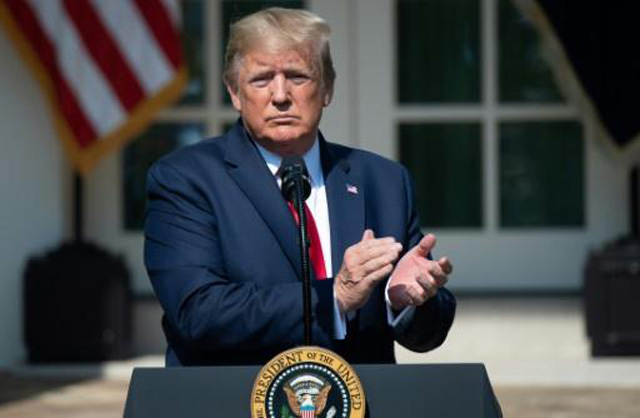
New York, United States | AFP | Earlier US tariffs enacted in President Donald Trump’s trade war with China have dealt only a glancing blow to consumers, but those announced Thursday are different.
“This hits consumers straight on,” Steve Pasierb, president of the Toy Association, said in an interview. “This is finished products. It’s not raw materials.”
The tariffs, a 10 percent levy on $300 billion in Chinese goods that Trump said would go into effect on September 1, is expected to affect just about all finished products imported from China.
Items that will likely have a levy include hairdryers, sneakers, flat screen televisions, bridal wear and other special occasion apparel.
The prospect of such broad-based tariffs has loomed over retailers for months and has been referred to as the “boogeyman” outcome by some in consumer-facing industries.
“It’s very unfair to the American consumer. It’s very unfair to the manufacturer and it shouldn’t be happening,” said Stephen Lang, chief executive of Mon Cheri Bridals in New Jersey and the head of the American Bridal & Prom Association.
Lang said that a 10 percent levy was less onerous than the 25 percent tariff that has been discussed and which he has previously described as catastrophic.
But Trump said Thursday he could lift the levy to “well beyond 25 percent,” referring to the 10 percent level as “for a short-term period.”
“We have too much testosterone between this government and their government, and we’re getting caught in the crossfire,” Lang said.
– Retail shares hit –
Leading trade groups criticized the announcement.
“We support the administration’s goal of restructuring the US-China trade relationship. But we are disappointed the administration is doubling down on a flawed tariff strategy,” said National Retail Federation senior vice president David French.
“These additional tariffs will only threaten US jobs and raise costs for American families on everyday goods.”
“Retaliatory tariffs, whether 10 percent or 25 percent, are bad policy,” said Gary Shapiro, president of the Consumer Technology Association. “Tariffs are taxes paid for by US consumers, not China’s government. These retaliatory tariffs are not an effective trade policy and may violate US law.”
Shares of retailers fell sharply Thursday, with the biggest drops affecting a group that included Best Buy, Target and Macy’s. Others to decline included Apple and Nike.
Retail giants Amazon and Walmart also dipped, but by less than most of their rivals because they are viewed as having more leverage with suppliers.
During an earnings conference call in May, Walmart Chief Financial Officer Brett Biggs said the company’s merchant teams have been focused on tariffs “for months and continue to execute appropriate mitigation strategies,” as he warned that some pricing impact was inevitable.
“We’re going to continue to do everything we can to keep prices low. It’s who we are,” Biggs said. “However, increased tariffs will lead to increased prices for our customers.”
Best Buy declined to comment Thursday, but argued against tariffs during a public comment period in June.
In a letter to United States Trade Representative Robert Lighthizer, Best Buy noted that the Trump administration had previously not imposed tariffs on flat screen televisions, laptops and other consumer items.
“Best Buy respectfully submits that USTR should not impose tariffs on the above-referenced consumer economics, just as it did last year when it wisely chose to forego imposing tariffs on flat panel televisions and other consumer electronic devices because of the negative impacts on the US consumers and economy,” the company said.
– Threat to economy? –
Thursday’s move could threaten US consumer spending, a bedrock of support of the American and global economy that has continued to show strength in economic indicators even as manufacturing and corporate spending trends have weakened.
Pasierb of the Toy Association said the impact of the tariffs may be mitigated in his industry somewhat because many retailers have imported goods earlier this year because of tariff risk.
But broad-based tariffs are a concern “because if all these goods become more expensive, you won’t have as much discretionary money for toys,” he said.
“My deep concern is that this is going to hit spending in the last three months of the year, which is our make-or-break period.”
 The Independent Uganda: You get the Truth we Pay the Price
The Independent Uganda: You get the Truth we Pay the Price



